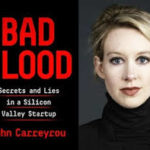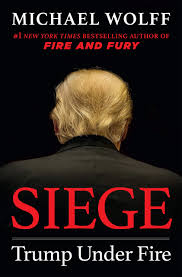
Being a frugal kind of guy in Semi-Retirement, whenever possible I like to get books out from the library, whether old-fashioned physical books, e books or audio books. The main problem with this, however, is that you usually have to wait several weeks or even months to get to the head of the line for the latest bestsellers.
On a recent long weekend (the one before this one!) two bestsellers arrived the same day, which meant the pressure was on to read them in the three weeks allotted. Neither was likely to qualify for renewal, since there was a long queue of other readers waiting for their return.
The first, which arrived in e-book format, was Bad Blood, a book I had ordered several weeks earlier and has only recently slipped off the bestseller list. The other one was brand new: Michael Wolff’s followup book on Donald Trump, entitled Siege: Trump under Fire. On this one, I got really lucky, just happening to be in the library a day or two after the local branch’s local copy went on display.
Still, suddenly I had two books to read at once, which meant that anything else I either owned or was more likely to be renewable had to be put aside. No one said being frugal was easy!
I ended up reading both books over a long three-day weekend by adopting a strategy of reading a chapter in one, then switching to the next chapter in the other. Which is how I realized there were some fascinating parallels between the two books. It was something of a surreal experience, as I’m sure no one else on the planet would have read these two books simultaneously in this fashion.
Billionaires, or Thousandaires?
Both involve supposed American billionaires, although this point is debatable about both subjects. Trump’s billions are often supposed to be fanciful, which is why one New York Times columnist once earned Trump’s ire by dubbing him a “thousandaire.”
The other was a billionaire for awhile, at least on paper but these days she may not even be a thousandaire. I’m referring to Elizabeth Holmes, a young Stanford dropout who hero-worshipped Apple’s Steve Jobs and started a blood-testing company in California called Theranos.
The only problem, as Bad Blood recounts at length, is that apparently Theranos supposed ground-breaking technology didn’t work. Google Elizabeth Holmes and you can find a bunch of short videos that describe the sordid tale if you missed it the first time around and don’t wish to join the library queue for the book.
Blinded by ambition and the quest for fame and wealth, it appears Holmes and her much older partner/lover (Ramesh “Sunny” Balwani), cut numerous corners and forgot the first rule of health care is to first do no harm. They raised billions from investors, in the process fooling such retail giants as Walgreens and Safeway. Holmes had founded the firm in her early 20s and used her influential rolodex to suck in many investors who should have known better. She also was famous for emulating Jobs and his attire of a black turtleneck sweater. And finally, as any number of Google searches will demonstrate, she pitched her voice a few octaves lower so as to impress prospects and investors with a deep baritone she must have felt would allow her to be taken more seriously.
Will Trump’s reign also end in tears?
 Wolff’s Siege was released just a year after his previous Trump bestseller, Fire & Fury, and relies just as much on input from Steve Bannon. As I read and alternated chapters between the two books, it was fascinating to watch the unravelling of Holmes and to wonder whether Wolff was describing a similar unravelling of the Trump presidency. Certainly, Wolff depicts an isolated and desperate president and has predicted it will all end in tears: not necessarily ours but of Trump’s.
Wolff’s Siege was released just a year after his previous Trump bestseller, Fire & Fury, and relies just as much on input from Steve Bannon. As I read and alternated chapters between the two books, it was fascinating to watch the unravelling of Holmes and to wonder whether Wolff was describing a similar unravelling of the Trump presidency. Certainly, Wolff depicts an isolated and desperate president and has predicted it will all end in tears: not necessarily ours but of Trump’s.
At one point, Bannon predicts that if Trump eventually finds himself out of options, he will “fake a heart attack.”
Whether that occurs or not, I have no idea. I certainly regard Trump as the ultimate Teflon Man, who seems so far to have escaped paying the consequences of his many questionable deeds. At one point in the book, when Wolff suggests Trump is the head of a semi-criminal enterprise, Bannon reassures him he can drop the “semi” qualifier.
As for the investment implications of these books, I refer to a MoneySense column I wrote, reprised here at the Hub last fall, which looks at my take on more than a dozen Trump tomes I have had the misfortune to consume. They include the fairly glowing take by Conrad Black, A President Like No Other, which various pundits have criticized following Trump’s controversial pardon of Black earlier this year.
The Holmes drama is more straightforward for investors. Theranos is a cautionary tale for investors prone to accept the marketing claims of modern tech entrepreneurs. Even after the Wall Street Journal exposed the scam – John Carreyrou was both the reporter who broke the story as well as the author of Bad Blood – Holmes gamely tried for awhile to keep her empire from crumbling. Shortly after the story broke, she even tried to defend herself in a Mad Money episode with Jim Cramer, who was justifiably skeptical but determined to let her tell her side of the story.
So there it is: Trump and Holmes, two American entrepreneurs and would-be billionaires who appear to have been masters about fooling most of the people most of the time. Holmes’ comeuppance ( I call it Karmuppance in my book Findependence Day) happened swiftly and severely. It remains to be seen how the Trump drama ultimately winds down. Hopefully not, as was the case with Theranos investors, in tears for everyone.


